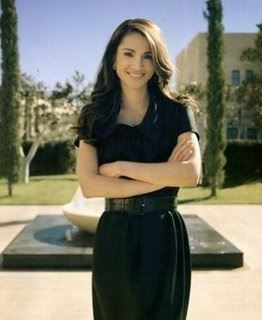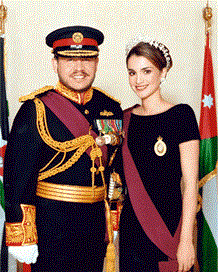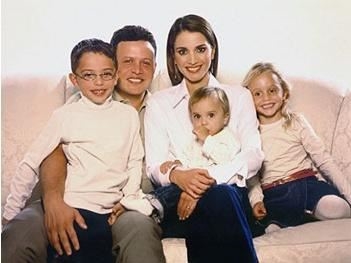 |
| Queen Rania (wordpress.com) |
Her Majesty Queen Rania Al-Abdullah of Jordan once said, “I just wake up and feel like a regular person. At the end of the day you are living your life for the people that you represent. It’s an honor and a privilege to have that chance to make a difference — a qualitative difference in people’s lives — and it’s my responsibility to make the most out of that opportunity” (“Rania”). Queen Rania abides by what she speaks, because even though she wasn't born a queen, she has taken on the austere responsibilities of being queen, and from that, is creating positive transformations in people’s lives. She remains down-to-earth and benevolent despite her fame and power, while enduring discrimination being thrown at her from every perspective. She bestows hope and inspiration upon women and children, giving them aspirations for a better life and a better future, and as an advocate of citizen’s rights, she improves the lives people on both a local and global level.
 |
| King Abdullah and Queen Rania (payvand.com) |
Queen Rania, originally known as ‘Rania al-Yasin’, was born in Kuwait on August 30, 1970 to a successful family. At first she was educated in private schools across Kuwait, but later attended an American University in Cairo, Egypt, graduating with a bachelor’s degree in business administration in 1991. After her graduation, could not return to Kuwait because “a year earlier, the country had been occupied by Iraqi forces under Saddam Hussein, and her family had been forced to flee to Jordan” ("Al–Abdullah"). In Jordan, she found a job with Citibank and later began working for Apple Computer. In 1993, a business associate presented her with a dinner invitation to the house of Princess Aisha of Jordan. At the time, Princess Aisha’s brother, Prince Abdullah, was serving in the Jordanian military, and was infatuated with Rania as soon they met. The two began dating away from the public eye, and were soon married five months after they first met. They began their family — currently with four children — that same year. Rania became a princess upon her marriage, but it was not expected that she would ever become a queen, since Abdullah was not first in the order of succession to become the heir of his father, King Hussein. Before King Hussein died of cancer in 1999, he changed his will, designating Abdullah as his successor. Abdullah then elevated his wife’s title to “Queen”, giving her the freedom to use the power appointed to her the way she thought fit.
 |
| (sweetestmemories.com) |
Her childhood and her life before becoming queen provide her with morality and skillfulness that she uses to unite her many roles of wife, mother, philanthropist, activist, and Queen. Flawlessly balancing the jobs, allowing aspects of her life equal devotion, poise, wisdom, and modesty. Although she carries a demanding schedule, her husband and her four children remain her uppermost priority. “She prefers to take [her children] to school herself, in her BMW sport–utility vehicle, and the family can sometimes be seen dining in one of Amman's family–friendly restaurants, a Howard Johnson's eatery” ("Al–Abdullah, Rania."). Even though she is queen, her top priority is her family, showing how family oriented she is. Undeniably, “Like her mother–in–law, Rania has no official role or duties as queen according to Jordan's constitution. Yet she has followed Noor's path and chose to use her position to promote a number of social issues and important charities” ("Al–Abdullah."). Though it isn’t necessary for her to implement her right as queen, she chooses to use her available power and position to promote and establish a better Jordan and improve the lives of her people. Moreover, “At Rania's coronation, for which she chose to borrow rather than buy a tiara, the former Citibank executive became the youngest queen in the world. She and the new king, however, did not relocate with their children to the Ragadan Palace compound, but chose to remain in their villa in the hills overlooking Amman” ("Al–Abdullah”). The fact that she did not buy her tiara and chose to live in her own house instead of the palace shows that she wasn’t focusing on the glamour and “image” of a queen, but rather the obligations she would have: the authority to be able to improve her country and her people’s lives. Despite her selflessness and devotion, Rania is regularly plagued by prejudice and inequity, predominantly due to the fact that she is a woman. As opposed by many, “The "natural" course of action for an Arab woman these days — never mind an Arab queen — is often not the most accepted one” ("Jordan's”). Her liberal ideas put her in a convoluted place, where the demands of Arab and Muslim tradition remain potent — making her the target of scorn and criticism, mainly from Jordan's conservatives and traditionalists, who are usually men. They protest that women shouldn't “muck around” where they don't belong, and a queen, more than anyone, should know enough to follow protocol. Others ridicule her fashionable wardrobe and the adoration with which the Western media seems to treat her. ("Al–Abdullah"). In the face of adversity, all she does is stay strong, suffering this discrimination for the righteousness of her people, knowing that in the end it will not have been in vain.
Being a crusader for the rights of women and children, she gives a voice to those who need to be heard but have little power, bestowing upon them hope and inspiration for a better life and a better future. All of Queen Rania’s forefront efforts to enhance the lives of her people, revealing to them how caring and passionate she is about their well-being and their rights. Thus, making them want more to improve themselves past their full potential. For example, “In male-dominated villages in Jordan, where tribal codes are strong, she avoids the language of gender wars. She talks instead about the ability of women to help put bread on the table” ("Jordan”). Rania said, “I feel I do represent a large segment of women in the Arab world . . . I share with them their hopes and aspirations and the challenges they face. People in the West view Arab women as being very conservative...not necessarily being educated, and the truth of the matter is that we have many brilliant women who are very forward-looking” ("Jordan's”). The manner in which she speaks and stands up for the rights of women, especially how she says that she shares their hopes and challenges, really gives them more needed self-confidence, since she makes them feel as if they’re on the same level as her. Disdaining the fact that in her culture women don’t have “rights”, she motivates them by the way that she “avoids the language of gender”, and makes them feel that they are as significant as men in their bigoted place. All Queen Rania strives to accomplish in her own life gives her people hope and inspiration to endeavor achieving their own dreams.
Queen Rania is an assiduous supporter of advancements in education, technology and healthcare, as well as a forerunner in the battle to eradicate poverty and to bridge educational and cultural divides. “Her public role in Jordanian domestic politics and foreign relations steadily increased after she became queen in 1999. She serves on numerous boards and committees dedicated to supporting women, children, and family life, and her role in public life extends beyond Jordan. In 2002 she became a member of the board of the powerful World Economic Forum, the only board member from an Arab country. In 2003 and 2004, she served as president of the Arab Women's Summit, a forum of Arab first ladies, activists, and other professionals” (Ryan). Queen Rania has also established The Jordan River Foundation, which for over ten years has provided families with skills and knowledge to work themselves out of poverty (“Rania”). Today, it partners with entire communities to bring resources, energy, and change to the lives of vulnerable citizens, empowering and inspiring them to believe they can make a difference for themselves and their loved ones. Amongst all the work she is involved in, of chief importance to her is the focus of women and children’s rights. Particularly, she has centered her energy on the issues of domestic violence, and the protection of women and children against abuse. In Jordan and the Middle East, she is demanding an end to “honor killings”, cases where a woman is the victim of sexual assault, or is allegedly engaging in premarital sex, and is murdered by her male relatives ("Al–Abdullah”). Sentences against men in Middle Eastern nations are often very lenient in such crimes, and Queen Rania is working to help revoke these disgracefully biased and unjust laws (“Rania.”). “She launched the Child Safety Program in 1998, and also established Dar Al Aman, "Home of Safety", for young victims of abuse. The shelter is the first of its kind in the Arab world” (“Al–Abdullah”). “Abroad, Queen Rania works for greater global action on access to quality education, and in her capacity as Eminent Advocate for UNICEF and Honorary Chairperson for UNGEI, she campaigns on behalf of children in need. She also participates in international gatherings, such as the Clinton Global Initiative and the World Economic Forum, of which she is a Board Member. As an Arab, Muslim woman, Queen Rania is committed to reconciling people of different faiths and cultures by encouraging cross-cultural dialogue, particularly amongst young people” ("Rania."). As the head of Jordan’s Human Rights Commission, she strives to find a balance between long-standing cultural traditions and basic human rights. In addition to technology in education, she is also an advocate of health education. As president of the Jordan Society for Organ Donation, she educates the public on the importance of donating organs, and helps improve the process of organ donation and transplants within Jordanian hospitals (“Rania.”). She also leads Jordan's Blood Disease Society, which helps educate the public on blood diseases and their prevention (“Rania.”). Additionally, she is involved with the Jordan Cancer Society and the Global Alliance for Vaccines and Immunizations, amongst other healthcare advocacy groups (“Rania.’). Queen Rania firmly believes that the future welfare of Jordan is extremely dependent on the economic development and success of its citizens. The majority of her actions are committed to the welfare of her people, proving her self-sacrifice, determination, and love for her country.
Though Queen Rania was never expected to be so victorious and successful, she remained true to her beliefs, and endured the hardships that her beliefs brought her. She still strives to make the lives of her people better, even if it means having to suffer even more discrimination. It is apparent why so many consider the regal Queen Rania to be a role-model and a hero, not only for women in the Arab world, but for women and children everywhere.
Page created on 5/21/2010 12:00:00 AM
Last edited 5/21/2010 12:00:00 AM
